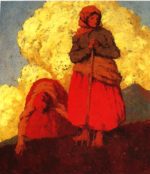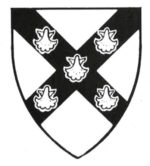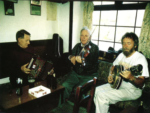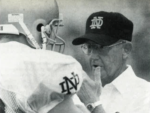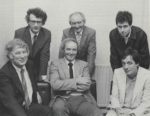Whether they're baked, boiled, roasted, fried, mashed or hashed, potatoes are a cornerstone of Ireland's diet. Hardly a dinner is served without its helping of boiled spuds. Fish invariably comes with a side of crisp chips. Colcannon (mashed potatoes with kale or cabbage) can almost be called a national dish. In fact, potatoes are so much a part of life in Ireland that many … [Read more...] about Sláinte!: There is Nothin Like a Spud
In This Issue 1994
Irish Roots: O’Connell, Connolly, Conlon and Connellan
The name Connolly is derived from several different roots. In Connaught and Monaghan it derives from the Gaelic O'Coingeallaigh. Both are anglicized to Connolly although the spelling form Connelly is often found in Galway. There have been several famous bearers of the name. In the early 18th century William Connolly (1660-1729) was an eminent lawyer and politician. His family … [Read more...] about Irish Roots: O’Connell, Connolly, Conlon and Connellan
A Musical, Magical, Mystical Tour of Ireland
Mick Moloney, the folklorist, tenor banjo player, songster, wit, and raconteur offers a tour of Ireland to end all tours. On both sides of the Atlantic, Mick Moloney is known for his expressive traditional singing and tenor banjo playing dexterity, and he performs widely with Derry fiddler Eugene O'Donnell and set dancing champion Regan Wick, and with the touring ensemble The … [Read more...] about A Musical, Magical, Mystical Tour of Ireland
The Origin of “The Fighting Irish” Nickname
This exchange in a novel about college sports in the 1920s catches the prejudices that many Americans of the time held toward citizens of Irish-Catholic descent. However, unlike other immigrant groups who tried to submerge their ethnicity into the American melting pot and considered such terms as "Polack" and "Bohunk" insults, Irish Catholics gloried in many of their nicknames, … [Read more...] about The Origin of “The Fighting Irish” Nickname
Plunging Into Irish Studies
Seamus Deane, a renowned literary scholar, fills a void at Notre Dame The University of Notre Dame, the home of the Fighting Irish, is the sentimental alma mater of many more actual and would-be Irish-Americans than ever have studied here. Yet until now, the most identifiably Catholic institution in the country--one where 14 of 16 presidents have been priests of Irish birth … [Read more...] about Plunging Into Irish Studies

